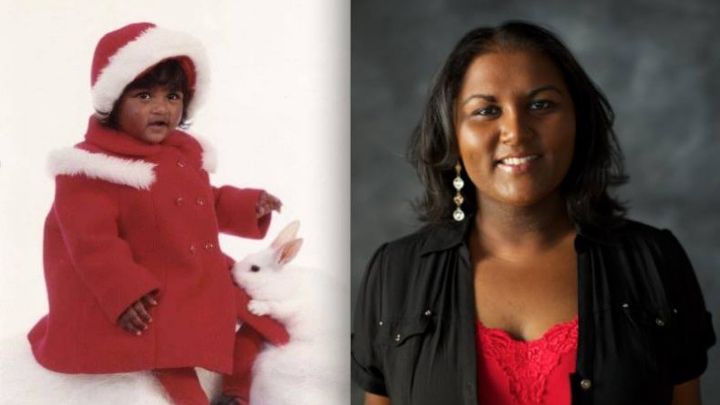
Cherish Family Search/Dissertation
Donation protected
Hi. My name is Abby Lloyd, and I am an adoptive parent and friend of Cherish Asha Bolton. Cherish is an adult adoptee from India. Her story is below. Cherish has selflessly volunteered thousands of hours of her time helping families like mine navigate transracial adoption. She has done this in multiple ways, including through her contributions to transracial adoption Facebook pages, as well as in private messages and in-person meetings with adoptive parents. She's done this for no other reason than to help our kids. I for one am forever grateful to her. When I learned Cherish needed help funding a birth family search and important reseach for her dissertation regarding the history and ethics of intercountry adoption, I wanted to help. With her blessing, I set up this page.
Here is Cherish's story and reason for seeking funding, in her own words:
I am humbly seeking funding to support two goals: 1) a birth family search in India to hopefully uncover my biological roots; and 2) research in India for my dissertation regarding the history and ethics of intercountry adoption.
I was adopted from the International Mission of Hope ("IMH") in 1984, arriving to the US at only 8 weeks old. I had been dropped off at IMH within 24 hours of birth in late-1983 weighing 2.5lbs and being 2 months premature. I stayed in the orphanage until I was big enough to fly, at which time I was flown to Ohio under the care of an organization of flight attendants who transported international adoptees in their free time. Here is a picture of me as a baby.
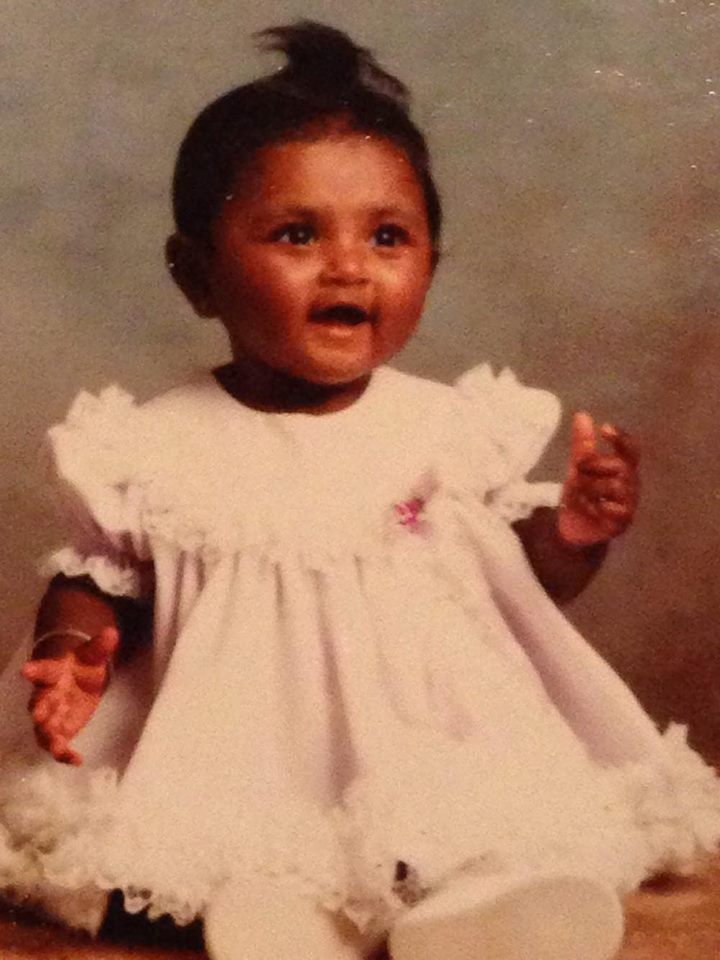
There is no information in my adoption file about my birth family, though the agency told my parents that my mother was young and unmarried (judging off of my size and circumstances of abandonment, not because they had that information).
I was adopted into a family who already had 3 pre-teen and teen boys, and they could not keep trying for girls. They decided to adopt after being inspired by a friend who worked as a missionary doctor in India who had adopted. Below is a picture of me, as a young child, with my family.
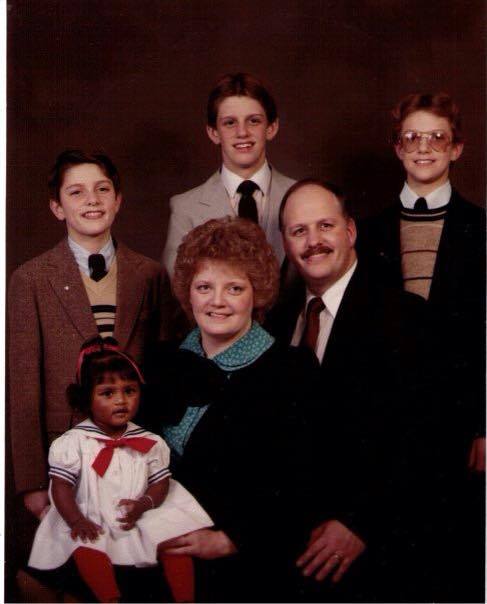
We moved to Virginia, and I grew up close to my adoptive maternal grandparents. When I was 13, my adoptive mother developed breast cancer which had spread to her spine and liver by the time it was found. After six months of chemo and radiation, my adoptive mother died, leaving behind a barely teenage daughter (me), four grandchildren, her three married sons, and now widower husband. Below is a picture of me with my mom.
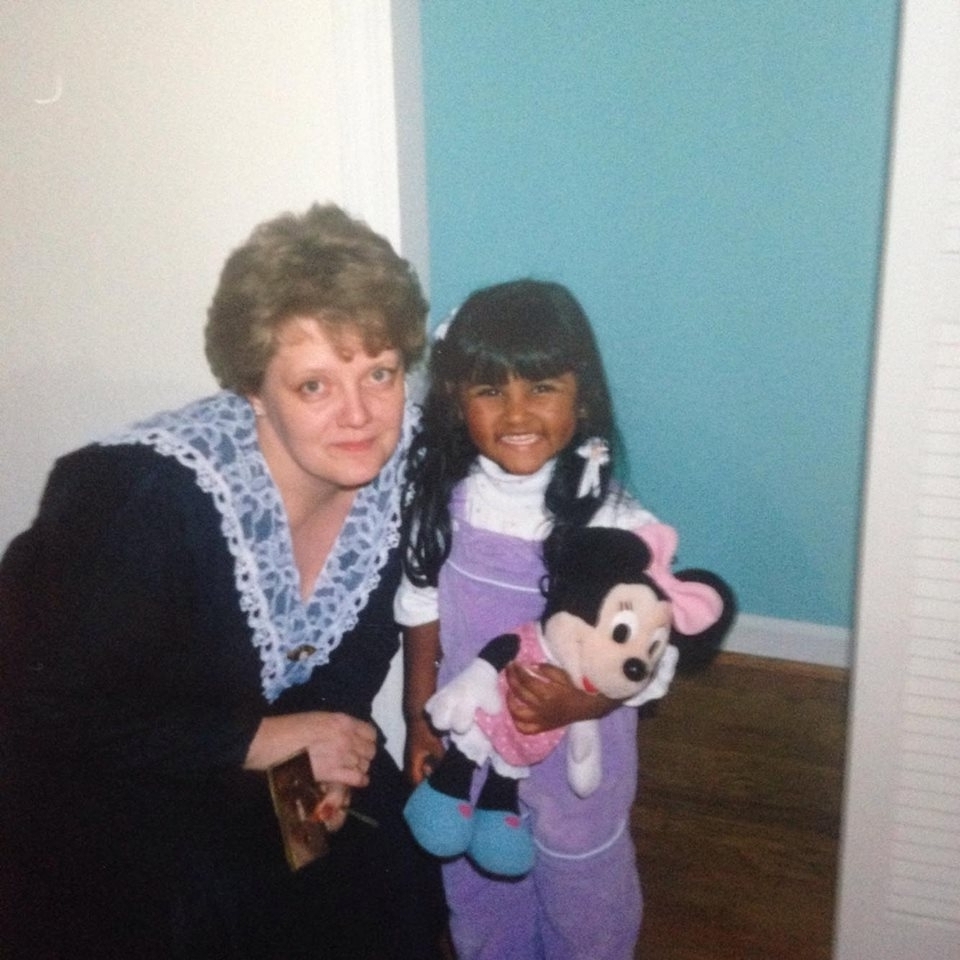
Fast forward through many years of grief and loss to 2010, when, after finishing a bachelors degree in history, I began to pursue an MA/PhD in history at the University of California, Irvine. My primary focus has been on British colonial India. As I've been learning more about the circumstances surrounding adoption in India, I found that there are legal connections between legislation during the British period and into the present. One such example was the law under which I was adopted, the Guardians and Wards Act of 1890, partially meant to protect the property holdings of children not protected under Hindu or Islamic kinship laws.
Why are Indian babies being internationally adopted under a 100-year-old law? My dissertation project will look at the origins of the law, its purpose, and its initial implementation in an effort to begin the discussion as to how it morphed into the legal foundation for intercountry adoption.
This summer I am planning a three month trip to India which will be two-fold. First, to research my dissertation, I will have to spend time in Kolkata, as it was the capital of British India when the law was created. I will have to spend time in Delhi, as that is the current seat of government and where amendments and Supreme Court decisions occurred since Independence. And I will spend time in Maharashtra (Pune and Mumbai) as those areas had orphanages dating back to the act from 1890 (one of which is still active!). Second, while I am in Kolkata studying adoption, I will be initiating a birth parent search for myself. I will likely hire translators/guides and a private investigator to help. (I speak Hindi which will help me in Delhi and Mumbai but not in Kolkata where they speak Bangla.)
The cost for my travel + research costs + birth parent search expenses will total approximately $10,000. This is a conservative estimate and there could easily be additional translation and information-seeking costs, as well as ongoing search costs depending on what I find. I am a low-income doctoral candidate and woman of color embarking on a big project with a thin wallet. Your support will help me uncover my biological roots as well as further my academic research regarding the history and ethics of intercountry adoption. Thank you!
Cherish Asha Bolton
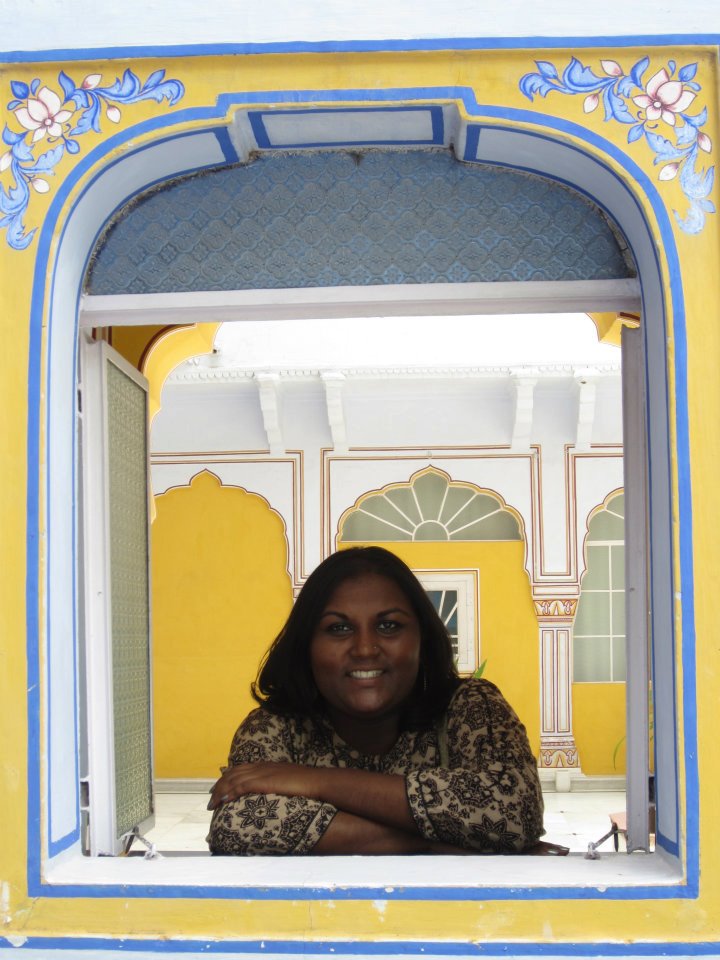
Here is Cherish's story and reason for seeking funding, in her own words:
I am humbly seeking funding to support two goals: 1) a birth family search in India to hopefully uncover my biological roots; and 2) research in India for my dissertation regarding the history and ethics of intercountry adoption.
I was adopted from the International Mission of Hope ("IMH") in 1984, arriving to the US at only 8 weeks old. I had been dropped off at IMH within 24 hours of birth in late-1983 weighing 2.5lbs and being 2 months premature. I stayed in the orphanage until I was big enough to fly, at which time I was flown to Ohio under the care of an organization of flight attendants who transported international adoptees in their free time. Here is a picture of me as a baby.

There is no information in my adoption file about my birth family, though the agency told my parents that my mother was young and unmarried (judging off of my size and circumstances of abandonment, not because they had that information).
I was adopted into a family who already had 3 pre-teen and teen boys, and they could not keep trying for girls. They decided to adopt after being inspired by a friend who worked as a missionary doctor in India who had adopted. Below is a picture of me, as a young child, with my family.

We moved to Virginia, and I grew up close to my adoptive maternal grandparents. When I was 13, my adoptive mother developed breast cancer which had spread to her spine and liver by the time it was found. After six months of chemo and radiation, my adoptive mother died, leaving behind a barely teenage daughter (me), four grandchildren, her three married sons, and now widower husband. Below is a picture of me with my mom.

Fast forward through many years of grief and loss to 2010, when, after finishing a bachelors degree in history, I began to pursue an MA/PhD in history at the University of California, Irvine. My primary focus has been on British colonial India. As I've been learning more about the circumstances surrounding adoption in India, I found that there are legal connections between legislation during the British period and into the present. One such example was the law under which I was adopted, the Guardians and Wards Act of 1890, partially meant to protect the property holdings of children not protected under Hindu or Islamic kinship laws.
Why are Indian babies being internationally adopted under a 100-year-old law? My dissertation project will look at the origins of the law, its purpose, and its initial implementation in an effort to begin the discussion as to how it morphed into the legal foundation for intercountry adoption.
This summer I am planning a three month trip to India which will be two-fold. First, to research my dissertation, I will have to spend time in Kolkata, as it was the capital of British India when the law was created. I will have to spend time in Delhi, as that is the current seat of government and where amendments and Supreme Court decisions occurred since Independence. And I will spend time in Maharashtra (Pune and Mumbai) as those areas had orphanages dating back to the act from 1890 (one of which is still active!). Second, while I am in Kolkata studying adoption, I will be initiating a birth parent search for myself. I will likely hire translators/guides and a private investigator to help. (I speak Hindi which will help me in Delhi and Mumbai but not in Kolkata where they speak Bangla.)
The cost for my travel + research costs + birth parent search expenses will total approximately $10,000. This is a conservative estimate and there could easily be additional translation and information-seeking costs, as well as ongoing search costs depending on what I find. I am a low-income doctoral candidate and woman of color embarking on a big project with a thin wallet. Your support will help me uncover my biological roots as well as further my academic research regarding the history and ethics of intercountry adoption. Thank you!
Cherish Asha Bolton

Organizer and beneficiary
Abby Lloyd
Organizer
Laguna Hills, CA
Cherish Asha Bolton
Beneficiary